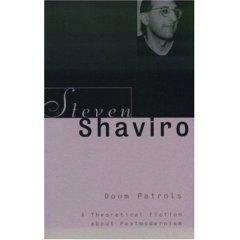
I owe Shaviro an intellectual debt. He took a lot of complex, mysterious concepts/theorists and filtered them through the lense of Grant Morrison's comic series Doom Patrol (and much, much more). It exploded my understanding of cultural/literary analysis as dry, dusty, lectures that instruct and opened me up to the idea of interdisciplinary, traveling, parisitic dialogues that bring subjects alive.

From the Preface:
Doom Patrols, then, is not a work of historical scholarship or objective description or ideology critique or in-depth interpretation. I have scrupulously followed Oscar Wilde's two fine maxims, that the critic should avoid "careless habits of accuracy," and that he should strive "to see the object as in itself it really is not." Each chapter of Doom Patrols is headed by a proper name. But these names are themselves fictional, even when they ostensibly refer to actual individuals. For they are not identities, but singularities, as I try to work out in the course of the book. Any resemblances to persons living or dead, to objects or commercial products, or to other works of fiction and the characters and situations therein, are precisely that: resemblances, which is to say simulacra, deceptive and superficial imitations, fraudulent impersonations. All accurate depictions and representational correspondences, on the other hand, are accidental and unintended, and should be taken as signs of failure on the part of the author; the aim of the book being precisely to pervert and undermine all such forms and canons of representation.
Read Doom Patrols

No comments:
Post a Comment